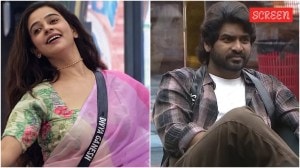No Questions Asked
As a schoolboy when asked to specify his religion in his matriculation form, Vasant Sathe wrote 8216;8216;humanity8217;8217; and in the ...

As a schoolboy when asked to specify his religion in his matriculation form, Vasant Sathe wrote 8216;8216;humanity8217;8217; and in the space for his caste he entered 8216;8216;human being.8217;8217; He responded enthusiastically to Gandhiji8217;s call during the 1942 Quit India movement. In college he was something of a golden boy; light eyed and handsome, good at his studies, a member of the debating, boxing and cricket teams and college union leader, he informs us. Sathe could have made a name for himself in any field. But when poor eyesight prevented him from taking up a commission in the Air Force, he studied law instead.
Sathe was an ardent supporter of the trade union movement, and later a member of the Socialist Party, since he considered the Congress Party too conservative for his ideological persuasion. It was only after the PSP merged with the Congress in 1964 that Sathe joined the Congress. Sathe claims proudly that he is above all a rationalist, who has never been afraid to question.
But somewhere along the twists and turns in his political career, the self-avowed idealism and rationalism of his youth seems to have deserted him. Sathe turned into an unquestioning, almost sycophantic, supporter of Indira Gandhi. Perhaps he realised that his only avenue for political advancement was clinging to the Gandhi family coattails, because Maratha leaders like YB Chavan, Vasant Dada Patil, VP Naik and Sharad Pawar from his home state were determined to keep down the political lightweight Brahmin from Vidarbha.
Sathe8217;s account of political events during his more than three decades in Delhi offers no new insight or behind-the-scenes revelations in the corridors of power. His recollections sound almost as if they have been culled from old newspaper clippings and his scrapbook. Sathe makes a stout defence of Indira Gandhi8217;s Emergency, asserting breezily that political detenues faced no great hardship and that most of them even put on weight in jail. He points out that Jyoti Basu used to get a car ride every evening with his family while in detention. For his loyalty to the Gandhi family, Sathe was rewarded with a series of ministerial berths as well as sinecures such as chairmanship of the Indian Council of Cultural Relations.
Surprisingly Sathe is slightly more forthcoming about his private life, candidly confessing that he developed physical intimacy with some understanding women with artistic inclinations. He does not give names but does recount how once Protima Bedi, who was dressed revealingly, was ticked off by his wife for indecent exposure. He recalls how Mohammed Yunus was so jealous of his friendship with the comely Uma Vasudev that he printed and circulated invitations of his marriage that-was-not to Uma in order to embarrass him.
- 0123 hours ago
- 0222 hours ago
- 0324 hours ago
- 041 day ago
- 051 day ago































